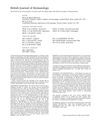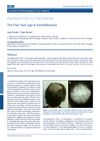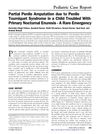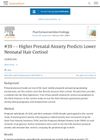 1 citations,
January 2003 in “Expert Opinion on Therapeutic Patents”
1 citations,
January 2003 in “Expert Opinion on Therapeutic Patents” Steroid sulfatase inhibitors could potentially treat hormone-related disorders like certain cancers, hair loss, acne, and improve cognitive dysfunction.
[object Object]  May 2012 in “Surgery (oxford)”
May 2012 in “Surgery (oxford)” Patients who survive critical illness often face long-lasting physical, mental, and cognitive issues, with many unable to return to work within a year.
 138 citations,
March 2001 in “Clinics in Dermatology”
138 citations,
March 2001 in “Clinics in Dermatology” Hair loss can significantly affect a person's self-esteem and body image, especially in young people, those who value their looks highly, and women.
 128 citations,
September 2013 in “Journal of Clinical Epidemiology”
128 citations,
September 2013 in “Journal of Clinical Epidemiology” The conclusion is that the risk of losing significance in meta-analysis results increases with smaller effects and more missing data, and using the median standard deviation for imputation is recommended.
 18 citations,
November 2000 in “British Journal of Dermatology”
18 citations,
November 2000 in “British Journal of Dermatology” Many skin patients have mental health issues, so dermatologists should consider psychological care.
 17 citations,
September 2020 in “Journal of Endocrinological Investigation”
17 citations,
September 2020 in “Journal of Endocrinological Investigation” Post-finasteride patients show changes in gut bacteria, possibly causing various symptoms.
14 citations,
January 2020 in “Women's health reports” Iron deficiency in menstruating women causes many health issues beyond anemia and needs early detection and treatment.
 13 citations,
June 2012 in “Journal of Dermatological Case Reports”
13 citations,
June 2012 in “Journal of Dermatological Case Reports” An 8-year-old boy with hair-pulling disorder had a bald patch that was confirmed not to be a fungal infection and was treated with therapy.
 9 citations,
February 2016 in “Cambridge University Press eBooks”
9 citations,
February 2016 in “Cambridge University Press eBooks” The conclusion is that self-concept, shame, and emotion regulation are key factors in hoarding disorder, body dysmorphic disorder, and trichotillomania, and should be targeted in treatment and research.
 8 citations,
September 2021 in “Skin appendage disorders”
8 citations,
September 2021 in “Skin appendage disorders” Trichotillomania treatment is most successful with a mix of behavioral therapy, medication, and social support.
8 citations,
November 2011 in “Journal of Medical Case Reports” Bupropion may help treat trichotillomania when fluoxetine doesn't work.
 6 citations,
January 2013 in “Urology”
6 citations,
January 2013 in “Urology” An 8-year-old boy with bed-wetting issues suffered a severe penile injury from tying a thread around his penis, requiring urgent medical treatment to avoid worse outcomes.
5 citations,
May 2015 in “JRSM open” If a child is losing a lot of eyelashes and it keeps happening, doctors should look carefully at their health history because it might be a sign of a different health problem.
 4 citations,
January 2019 in “Clinical and Experimental Dermatology”
4 citations,
January 2019 in “Clinical and Experimental Dermatology” The review found that individualized treatment and teamwork are important for trichotillomania, and patients who followed through with treatment often improved.
 3 citations,
March 2019 in “Post Reproductive Health”
3 citations,
March 2019 in “Post Reproductive Health” Testosterone replacement can help menopausal women with various symptoms, but should be used carefully and is not yet officially licensed in the UK for women.
 3 citations,
December 2001 in “Irish Journal of Psychological Medicine”
3 citations,
December 2001 in “Irish Journal of Psychological Medicine” Trichotillomania is a challenging-to-treat impulse-control disorder where individuals pull out their hair, more common in females, with some treatments showing benefits.
 2 citations,
August 2016 in “Experimental Dermatology”
2 citations,
August 2016 in “Experimental Dermatology” Finasteride treats baldness but may cause lasting sexual side effects.
 2 citations,
July 2016 in “Pharmacopsychiatry”
2 citations,
July 2016 in “Pharmacopsychiatry” A person with Turner Syndrome showed severe schizophrenia that didn't respond to treatment and had brain shrinkage.
 2 citations,
July 2005 in “Baylor University Medical Center Proceedings”
2 citations,
July 2005 in “Baylor University Medical Center Proceedings” A 4-year-old girl was diagnosed with trichotillomania, a condition where she pulls out her hair, which may resolve on its own or require therapy.
November 2024 in “Actas Dermo-Sifiliográficas” N-acetylcysteine and memantine are recommended as safe and effective treatments for trichotillomania.
 February 2024 in “Psychoneuroendocrinology”
February 2024 in “Psychoneuroendocrinology” Higher prenatal anxiety is linked to lower cortisol levels in newborns' hair.
 December 2023 in “Current psychosomatic research”
December 2023 in “Current psychosomatic research” Psychological interventions can improve the quality of life for women with PCOS.

The study concludes that long COVID recovery involves time, various treatments, and a strong patient-provider relationship.
[object Object]  December 2020 in “Current Sexual Health Reports”
December 2020 in “Current Sexual Health Reports” Finasteride can have lasting negative effects on brain function and behavior by disrupting neurosteroid production.
 April 2020 in “Journal of the Endocrine Society”
April 2020 in “Journal of the Endocrine Society” A patient with myotonic dystrophy had several autoimmune disorders and thyroid cancer, suggesting a possible link between these conditions.
January 2018 in “Journal of human virology & retrovirology” Lifestyle drugs are mainly used by wealthy people in India but could spread to others, affecting society and youth.
 May 2017 in “InTech eBooks”
May 2017 in “InTech eBooks” Hair pulling disorder is treated with therapy and medication; hair loss from tension can be reversed if caught early.
 January 2017 in “International journal of science and research”
January 2017 in “International journal of science and research” Trichotillomania is a chronic hair-pulling disorder, more common in females, treated with therapy and sometimes medication.
 April 2016 in “Journal of The American Academy of Dermatology”
April 2016 in “Journal of The American Academy of Dermatology” Different treatments are effective for hair loss conditions, but results vary by individual factors.
May 2015 in “UC Merced Undergraduate Research Journal” Behavioral therapies are more effective than drugs for treating trichotillomania.
























